In the 1940s and 1950s, in Warsaw's Ochota district, an elderly gentleman sat on a bench and stared at the Maria Skłodowska-Curie monument. Pointing to the sculpture, he could say:If I had married her, she would not have become a Nobel Prize winner. And he would be right!
The story of the acquaintance of Maria Skłodowska and Kazimierz Żórawski - because that was the name of the man - began several dozen years earlier. It was 1886. Eighteen-year-old Maria Skłodowska got a job as a governess in Szczuki near Ciechanów with the Żórawski family, who leased the village. The employers were wealthy:Mr. Żórawski made a considerable fortune in the sugar industry.
Maria was to teach the younger daughter of the hosts, Anna, who was almost 10 years old. As Skłodowska wrote, she was a good, clever child, but very messy and distracted . She also dealt with the education of the older daughter of the Żórawski family, Bronisława, a year younger than herself. The latter foster child became her good friend.
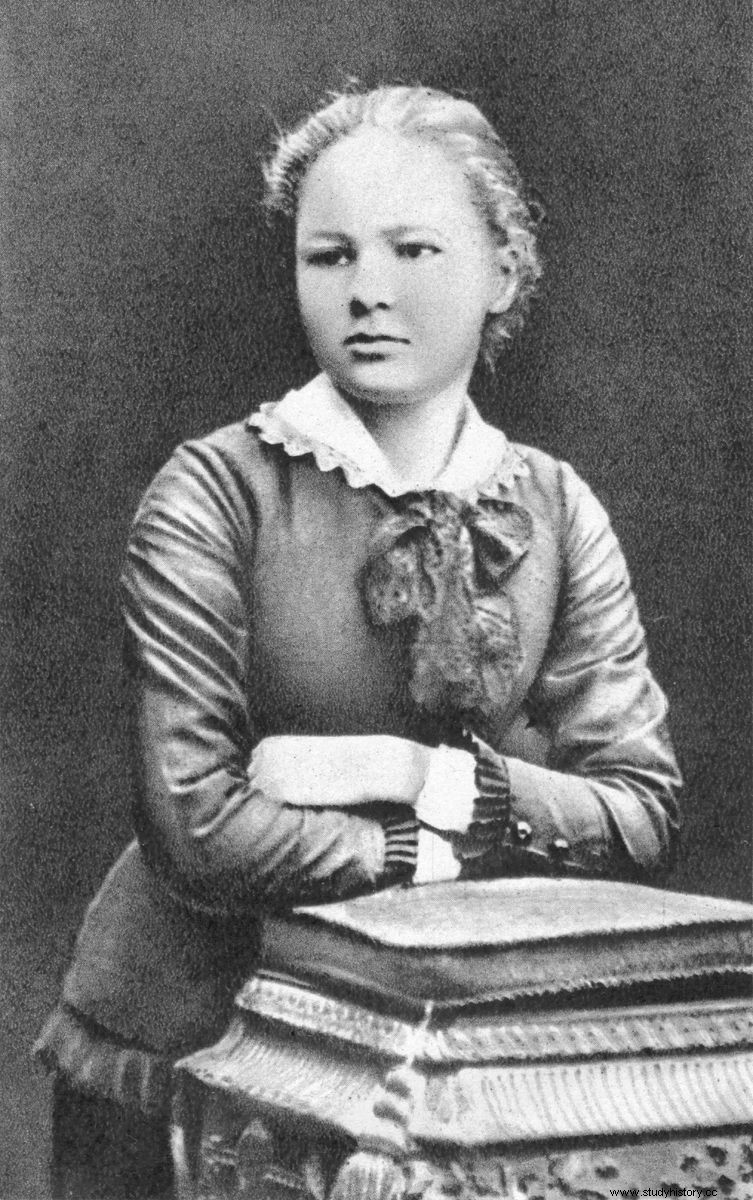
At the age of 16, Maria Skłodowska still had everything ahead of her. However, before she started climbing the career ladder, the girl experienced a painful disappointment (source:public domain).
Later, together with Brońcia, they gave lessons to village children. Even after the war, people who had completed their education at the elementary level, but who could boast that read and write were taught by the later Nobel Prize winner.
The "charms" of social life
Szczuki, to say the least, did not attract people of the intellect. The Żórawskis' social circle resembled the stupidest characters in Jane Austin's novel. In February 1886, Maria Skłodowska wrote to one of her friends:
They are not doing anything here, just having fun, and we are less involved in this general confusion of senses, they slander terribly, truly parish. Imagine that I was already a little talked about for the fact that a week after my arrival, without knowing anyone, I refused to attend a ball in K., a place that was a hotbed of gossip.
When eighteen-year-old Maria finally went to the ball, she noticed that the youth were uninteresting at all, while the virgins or geese, saying nothing, or highly provocative . She also claimed that among the young people there aren't enough people very nice and somehow intelligent, and there are a few specimens that could be given to the exhibition . In another letter, already dated April 1886, she in turn reported that:
Older ladies and ladies are what you'd expect from them, that is, they have no opinion of anything; But what is sad is that they cannot conduct even a salon conversation decently, so their heads are poor in ideas. So there is large-scale gossiping, because the only subject of conversation are neighbors and balls, meetings, etc.
Kazimierz enters the stage
Kazimierz Żórawski (signed also by Żorawski), the eldest son of Maria's employers, was a year older than the talented governess. As Françoise Giroud, the biographer of the Nobel Prize winner, wrote, he was a beautiful boy, full of charm, skillful skater, great dancer, a good party that all the mothers in the area were waiting for . He studied mathematics in Warsaw, he came to his home village for Christmas in 1886.
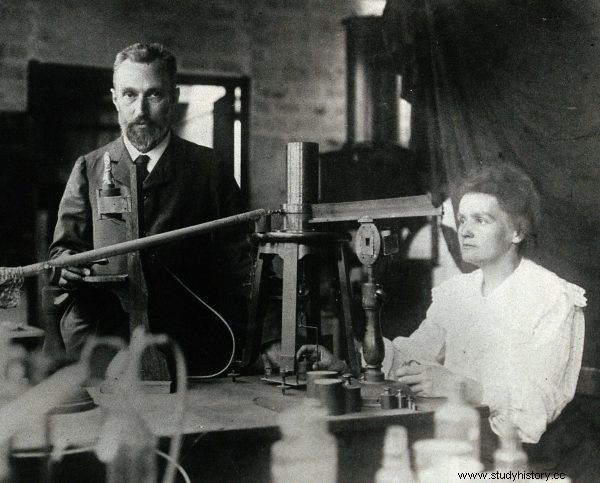
If Kazimierz's parents had agreed to his marriage with a poor governess, Pierre and Maria would probably never have met. Would Skłodowska still make a scientific career? (source:public domain).
A nineteen-year-old student and an eighteen-year-old governess fell in love with each other. They decided to get married, but Kazimierz's parents stood in the way. This is what Skłodowska's biographer, Susan Quinn, wrote about it:
Her intelligence, upbringing and noble origin did not matter much here - the Żorawski family believed that their son should not marry a person of such a low social status, without no additional assets.
Kazimierz returned to study in Warsaw, and Maria stayed in Szczuki. She could not quit her job, because part of her salary was allocated to her older sister, Bronisława Skłodowska, who was studying in Paris, who was ultimately supposed to bring her to the French capital.
Letters go home
It was not the end of Skłodowska and Żorawski's relationship. Kazimierz tried to break his parents' resistance a few more times, but did not have enough courage and determination . Echoes of this story were echoed in Maria's letters.
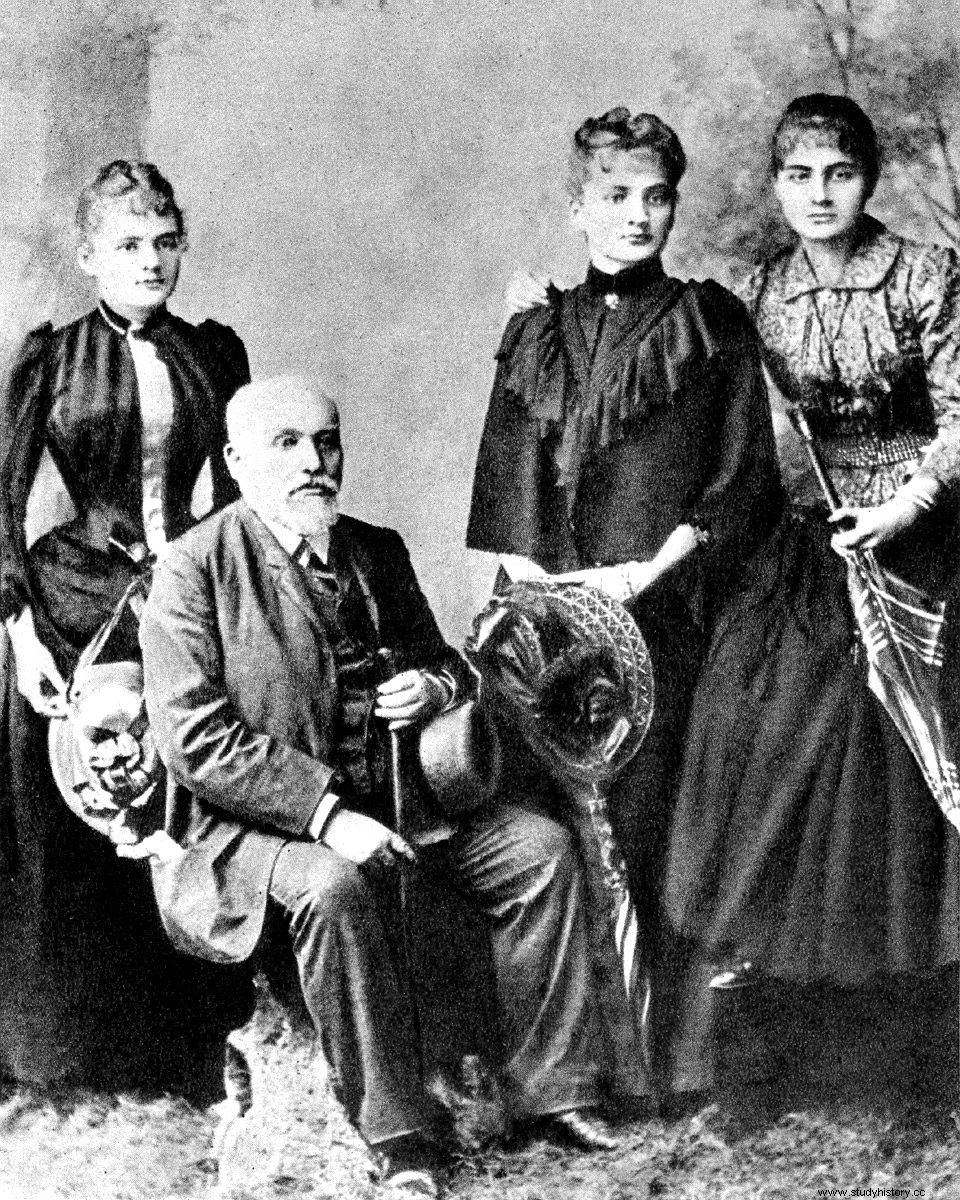
Not only Maria (left), but also her sister Bronisława (in the center) were rejected as candidates for a wife due to their property status (source:public domain).
Her father seems to blame himself for his daughter's misfortune, convinced that he did not provide the family with a sufficient material position. Anyway, Maria wrote to him:
First and foremost, my dear Father must stop reproaching himself for not being able to help us. It's impossible that Daddy could do more for us than he did. We have received a good education, a decent upbringing, a character that is also not the worst (...) Therefore, Dad should not reproach himself - we will do quite well, for sure.
However, when in 1887 her younger sister Helena was found, apparently for the same reason, an inappropriate party, the future Nobel Prize winner vented her anger in her letters. If they don't want to marry a poor girl, go to hell! - she was irritated.
Skłodowska remained in Szczuki for three years, until the beginning of 1889. At the end, she admitted in a letter to one of her friends that her stay there had changed a lot, both physically and morally. After all, she came to the Żorawskis at the age of eighteen! T I have come here, there were also such moments that I will count to the most painful in my life - she confided.
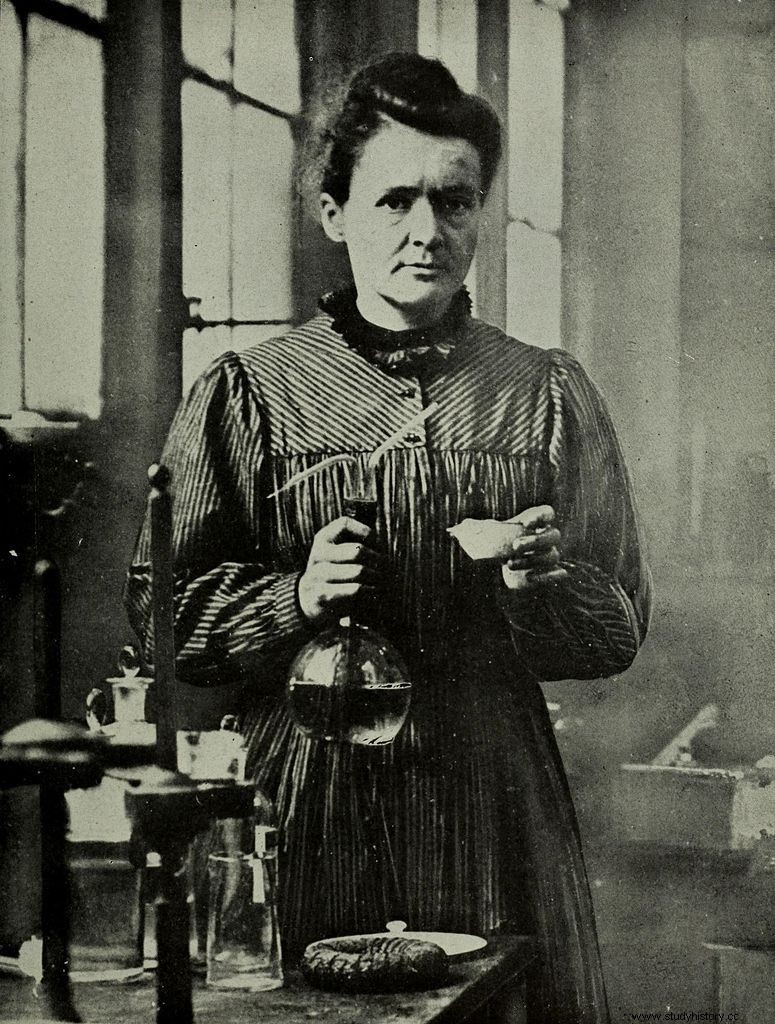
Laurent Lemire, a biographer of the Polish Nobel Prize winner, suggests that, at least in the beginning, Maria found the work to cure ... a broken heart (source:public domain).
After leaving the governess position, she found another job. She moved to Warsaw, where she began to carry out various experiments in physics and chemistry in a small laboratory. Laurent Lemire in the book "Maris Skłodowska-Curie", which has just been published, suggested that focusing on science could be a way of dealing with a broken heart:
It is then, during those first attempts, that he discovers the pleasure that experimental research can give him, and he comes to a psychological balance. Science as therapy. Thanks to these modest activities, Maria regains her energy and protects her sensitivity from the outside world.
Meeting in Zakopane
In 1891, two years after leaving Szczuki, Maria Skłodowska went to Zakopane. She wanted to improve her health there - she complained of a tiring cough. By the way, she was going to meet Kazimierz Żorawski. Could this meeting have ended happily? Józef Skłodowski, brother of the later Nobel Prize winner, had no illusions. In a letter to their sister Bronisława, he predicted:
Unless I'm wrong, Mania is again faced with disappointment from the same people who have let her down once. But if there is any hope of building a life in harmony with your own feelings and making two people happy, it might be worth trying.
Unfortunately, Józef's fears turned out to be well-founded. The attempt to settle down with Kazimierz failed. Immediately afterwards, Maria Skłodowska sent a letter to her sister who was staying in Paris: Now, Brońcia, I am asking you once again for a final decision:think if you can take me home, because I can come .
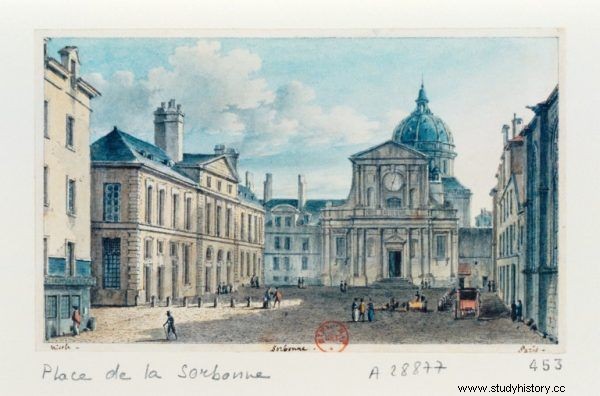
Studies at the Sorbonne were the proper beginning of Skłodowska's career. Soon after graduating, she met her future husband, Pierre Curie. The illustration shows the square and the chapel of the Sorbonne at the beginning of the 19th century (source:public domain).
After receiving a positive response from her sister, she left for France. As early as November 1891 she continued her education at the Sorbonne . She chose mathematics and physics as her field of study.
How to heal a broken heart? Work!
Paradoxically, three years later, there was a chance that Żorawski and Skłodowska would have the same employer. Kazimierz, after his doctorate in Leipzig and habilitation in Lviv, found employment at the Jagiellonian University. In 1894, Maria Skłodowska applied for a job at the oldest Polish university, but there was no room for her in any laboratory.
Most biographers are of the opinion that the chapter entitled "Kazimierz" in her life was closed long ago. However, some see it as an attempt to get close to youthful love and would-be fiancé ...
Maria Skłodowska settled permanently in France, where she fully spread her wings. Her scientific career has been spectacular. To this day, Maria remains the only woman who has been awarded the Nobel Prize twice. And the only scientist to receive these Awards in two different fields of life sciences:physics and chemistry.
Her personal life also turned out happily. She married Pierre Curie, with whom she had two daughters. Meanwhile, Żórawski remained in his homeland. Later he lectured at the Warsaw University of Technology. He got married as expected by his parents.
(Un) happy ending
It cannot be ruled out that the would-be spouses met again in 1932. Maria Skłodowska-Curie then came to Warsaw for the celebration of the blessing of the Radium Institute (and more precisely, its hospital part ... because that was all it was possible to complete).
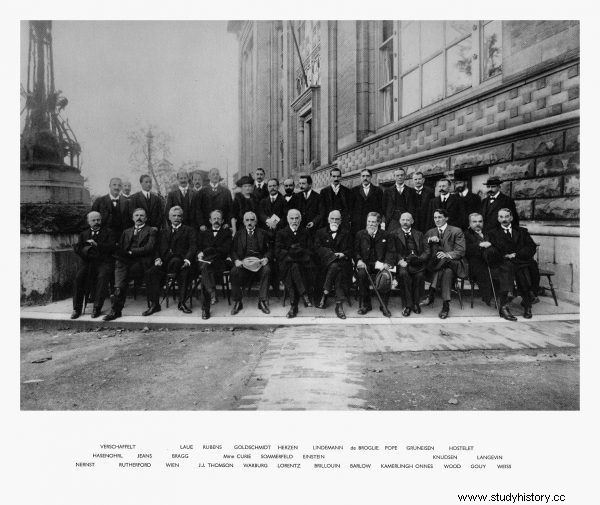
Despite the disappointment with her youth, Skłodowska's life could not have turned out better:in Paris she found both personal happiness and the possibility of scientific development. The photo shows the participants of the conference, which took place in Brussels in 1913. Apart from Marie Curie, Albert Einstein and Paul Langevin (source:public domain) took part in it.
Her friend from university, President Ignacy Mościcki, participated in the ceremony, but did Professor Kazimierz Żorawski appear then? It is not known ... It would be their last meeting, because the Polish Nobel Prize winner died two years later. Lucjan Biliński, writing about the would-be marriage of Kazimierz and Maria, wondered:
Perhaps, had she been his wife, she would not have gone that far into science, and certainly would not have become a Nobel Prize winner. But maybe she would be happier in life.
